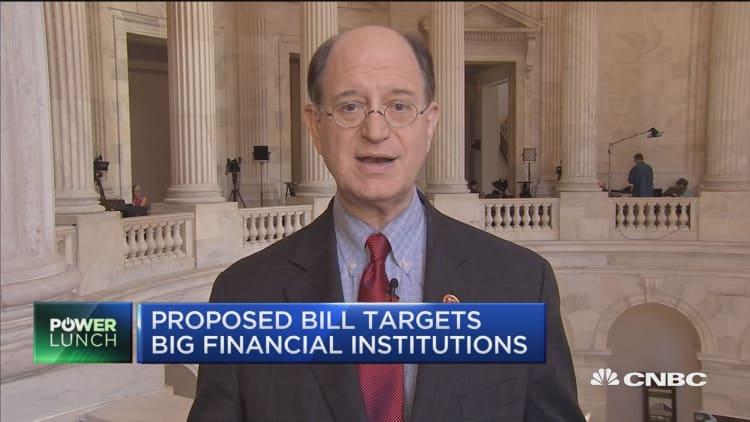Sen. Bernie Sanders wants to break apart giant financial companies including J.P. Morgan Chase, Goldman Sachs and Warren Buffett's conglomerate Berkshire Hathaway, arguing their individual sizes expose the U.S. economy to too much risk.
The Vermont independent and former presidential candidate introduced a bill Wednesday that would require the breakup of any financial company that has a total exposure of greater than 3 percent of gross domestic product. Based on that threshold, which is $584 billion, six banks and the four nonbanks would have to split up.
The banks are J.P. Morgan, Bank of America, Citigroup, Wells Fargo & Co., Goldman and Morgan Stanley. The nonbanks are Berkshire as well as Prudential Financial, MetLife and American International Group.
"No financial institution should be so large that its failure would cause catastrophic risk to millions of Americans or to our nation's economic well being," Sanders said in a statement. "We must end, once and for all, the scheme that is nothing more than a free insurance policy for Wall Street: the policy of 'too big to fail.'"
The bill is co-sponsored in the House by California Democrat Rep. Brad Sherman. "By breaking up these institutions long before they face a crisis, we ensure a healthy financial system where medium-sized institutions can compete in the free market," Sherman said in a statement.

It comes a decade after the collapse of Lehman Brothers and the near-collapse of AIG at the heart of the 2008 financial crisis. The federal government stepped in with a lifeline of $700 billion to buy faltering assets from banks and inject them with capital to weather the storm.
Had the "Too Big To Fail, Too Big To Exist" bill been law back then it would have forced Lehman, with assets that were more than 4.4 percent of GDP, and Bear Stearns, with assets at 2.8 percent of GDP, to restructure.
Kevin Fromer, the CEO of the Financial Services Forum representing the banking industry, said in a statement on Wednesday that banks have worked to strengthen themselves since the crisis and are more resilient than a decade ago.
"To have a large, strong economy that supports households and businesses big and small, you must have large, strong, global banks," Fromer said. "The banking industry and governments around the globe have made enormous strides during the past decade to ensure that large banks are safe and sound and that no institution is too big to fail. Policymakers must neither ignore the progress that has been made nor the essential role of large financial institutions in our economy."


